反义疑问句用法(最新全)
- 格式:doc
- 大小:119.50 KB
- 文档页数:7
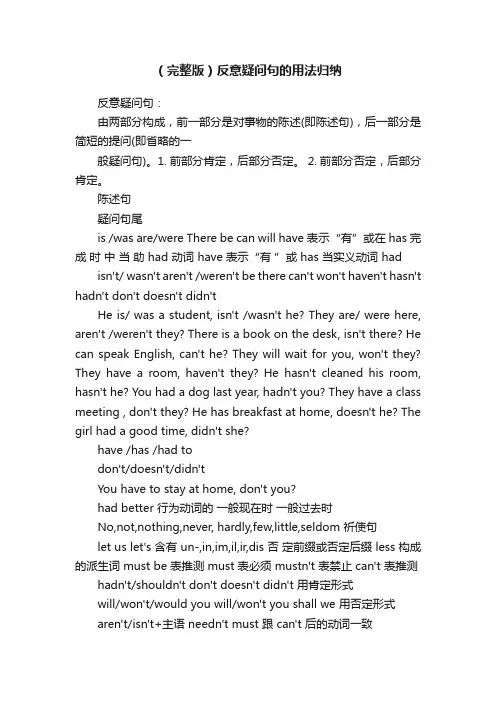
(完整版)反意疑问句的用法归纳反意疑问句:由两部分构成,前一部分是对事物的陈述(即陈述句),后一部分是简短的提问(即省略的一般疑问句)。
1. 前部分肯定,后部分否定。
2. 前部分否定,后部分肯定。
陈述句疑问句尾is /was are/were There be can will have 表示“有”或在 has 完成时中当助 had 动词 have 表示“有”或 has 当实义动词 had isn't/ wasn't aren't /weren't be there can't won't haven't hasn't hadn't don't doesn't didn'tHe is/ was a student, isn't /wasn't he? They are/ were here, aren't /weren't they? There is a book on the desk, isn't there? He can speak English, can't he? They will wait for you, won't they? They have a room, haven't they? He hasn't cleaned his room, hasn't he? You had a dog last year, hadn't you? They have a class meeting , don't they? He has breakfast at home, doesn't he? The girl had a good time, didn't she?have /has /had todon't/doesn't/didn'tYou have to stay at home, don't you?had better 行为动词的一般现在时一般过去时No,not,nothing,never, hardly,few,little,seldom 祈使句let us let's 含有 un-,in,im,il,ir,dis 否定前缀或否定后缀 less 构成的派生词 must be 表推测 must 表必须 mustn't 表禁止 can't 表推测hadn't/shouldn't don't doesn't didn't 用肯定形式will/won't/would you will/won't you shall we 用否定形式aren't/isn't+主语 needn't must 跟 can't 后的动词一致We'd better go now, hadn't/shouldn't we? They like playing football, don't they? He likes music, doesn't he? The woman bought a book, didn't she? He has hardly done his homework, has he? Please turn it on, will/won't/would you? Let us help him, will/won't you Let's have a rest, shall we? She dislikes it, doesn't she? You are unhappy, aren't you? You are hopeless, aren't you? He must be happy, isn't he ? You must do it today, needn't you? You mustn't talk like that, must you? He can't be a doctor, is he?I am 主从复合句 I think/believe/guess/ suppose+宾语从句并列句 used toaren't /ain't I; am I not I am your friend, aren't I一般跟主句一致He said she had been there, didn't he?动词和主语跟从句一 I think he'll come to help us, won't he? 致,用肯定还是否定 I don't think he is clever, is he? 根据主句来确定与邻近的分句一致Mary is here, but she was here just now, wasn't she?usedn't/didn'tHe used to be a teacher, usedn't/didn't he?5陈述句主语疑问句尾主语例句this, thatitThis is your brother, isn't it?These, thosetheyThese are not books, are they?oneone, heOne can't be always young, can one/he?something, anythingitNothing is serious, is it?everything, nothingEverything seems all right, doesn't it?everybody, everyoneEveryone knows this, don't they/doesn't he?somebody, someoneNobody likes to lose money, does he?anybody, anyonethey ,heNo one came , did they?nobody, no one,noneeither, neithereach ofthey ,heEach of the boys had an apple, didn't he /they?some(none) ofIt 或 they ,you None of the food was delicious, was it?Some of the men have come back, haven't they?or, and , neither…nor, either…or, both…and 复数代词Neither you nor I am wrong, are we? Both Tom and Jack came, didn't they?not only… but also not...but 等连接的并列主语不定式,动名词,从句或词组 the+ 形容词表示一类人 there 引起的句子it 复数代词 thereTo learn English well isn't easy, is it? Swimming is great fun,isn't it? The poor had no right to speak at that time, did they? There stands a house and a lot of trees, doesn't一、选择填空they? 6.--That's wrong, isn't it? -- ______1.Jim is a driver,_____?A. Yes, it is.B. Yes, it isn't.A. does heB. doesn't heC. is heD. isn't heC. No, it is.D. Yes, it was.2.You have a sports meeting every year,___? 7. Let's take a short rest, ______?A. have youB. do youA. do weB. aren't weC. haven't youD. don't youC. will youD. shall we3. He has never watched such an important8. Five-year-old children are too young to gomatch , _____ he?to school, ________ they?A. hasn'tB. hasC. isD. isn'tA. areB. aren'tC. wereD. have4.They have to work at once,______ they?9. Hundreds of people lost their lives in theA. haveB. haven'tC. doD. don'taccident,_______ they?5. She often feels tired,______ she?A. don'tB. didn'tC. doD. didA. doesn'tB. doesC. isD. isn't10.There isn't any bread on the table, ______?6A. isn't thereB. is thereC. has thereD. is it11. Mr King can not speak Chinese,____ he?A.doesn'tB. doesC. can'tD. can12. Lily didn't come to school, did she?____. She was ill in bed.A.No ,she didB. Yes , she did.C. No ,she didn't.D. Yes ,she didn't13.--She isn't a teacher, is she?--_____. She works in a hospital.A.No ,she isB. Yes , she is.C. No ,she isn't.D. Yes ,she isn't14.Lily looks like Lucy,_______?A. is LilyB. isn't sheC. does LillyD. doesn't she15.Tom often has lunch at school,_____?A. doesn't TomB. doesn't heC. does TomD. doesn't he16. Your family has no colour TV___it?A. hasn'tB. doesn'tC.isD. has17.You could hardly believe what he had said, _____ you?A. couldB. couldn'tC. canD. were18. --You don't smoke, do you?--______.A. Yes, I don'tB. No, I doC. No, I don'tD. Yes, I am.二、完成下列反意疑问句.1.You are late, ________ __________?2.He is on time,_________ _________?3.They were in the classroom just now,________ _________?4.She was ten years old last year_________________?5. They are going hiking next Sunday,________ _________?6.That cat is running up the tree.7.Ann is going to help me with my English8 There is some water in the bottle,___________________?9.There are many soldiers over there, _______ __________?10.He can skate, __________ ___________? 11.My parents can play chess,_____ ______? 12. They will work on the farm,________ _________? 13. My parents will visit my grandparents next Monday,________ _________? 14. They have written nine books since 1995,________ _________? 15, The woman has already found her son. ,________ _________? 16. They have three balls,_______ ______? 17. Jack has two sister,________ _______? 18.They have six classes every day,________ _________? 19.Tom has lunch at home,_____ _________?20.The students had a good time last Sunday,___________ ____________? 21. We have to finish it,______ ________? 22. The workers had to take the first bus, ________ _________? 23. You had better stay at home today, _________ __________? 24.We clean our classroom every day, ________ _________? 25. He watches TV on Saturday evening,________ _________? 26. The boys often play football on the playground,________ _________? 27.The singerswent to H.K yesterday, ________ _________? 28.They studied hard last year,________ _________? 29.They planted many trees last month,________ _________? 30.This pen is yours,_________ __________? 31.That was a wonderful film,______ _____?32.Everything is ready, ________ ________? 33.There is nothing wrong with the radio,___734.He did little homework yesterday, _______ __________?35.You'd like some coffee,______ ______? 36.Let's have a rest, _______ ____________? 37.Let us read the text, ________ ________?38.Don't read in bed, _________ _________? 39. Stop laughing,_______ __________? 40. He has to go there at eight,______ _____? 41.He has never been to Beijing, _____ ____? 42.She can hardly speak,_______ ________? 43.Few people know her here______ _____? 44.His mother was unhappy when she heard the news, _____ _______? 45.She dislikes watching football match____ ______? 46.He used to swim in the river,____ _____? 47.I think your brother is right, ____ ______?48. I don't think he will go there,____ _____?选择疑问句选择疑问句说话人对问题提出两个或两个以上的选项,让对方选择回答。
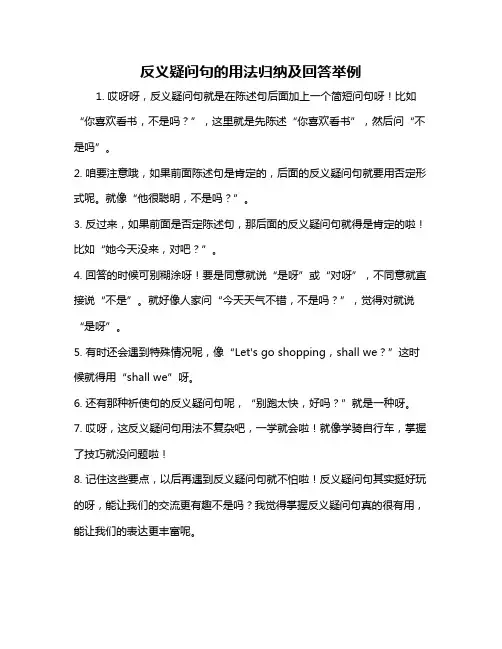
反义疑问句的用法归纳及回答举例
1. 哎呀呀,反义疑问句就是在陈述句后面加上一个简短问句呀!比如“你喜欢看书,不是吗?”,这里就是先陈述“你喜欢看书”,然后问“不是吗”。
2. 咱要注意哦,如果前面陈述句是肯定的,后面的反义疑问句就要用否定形式呢。
就像“他很聪明,不是吗?”。
3. 反过来,如果前面是否定陈述句,那后面的反义疑问句就得是肯定的啦!比如“她今天没来,对吧?”。
4. 回答的时候可别糊涂呀!要是同意就说“是呀”或“对呀”,不同意就直接说“不是”。
就好像人家问“今天天气不错,不是吗?”,觉得对就说“是呀”。
5. 有时还会遇到特殊情况呢,像“Let's go shopping,shall we?”这时候就得用“shall we”呀。
6. 还有那种祈使句的反义疑问句呢,“别跑太快,好吗?”就是一种呀。
7. 哎呀,这反义疑问句用法不复杂吧,一学就会啦!就像学骑自行车,掌握了技巧就没问题啦!
8. 记住这些要点,以后再遇到反义疑问句就不怕啦!反义疑问句其实挺好玩的呀,能让我们的交流更有趣不是吗?我觉得掌握反义疑问句真的很有用,能让我们的表达更丰富呢。
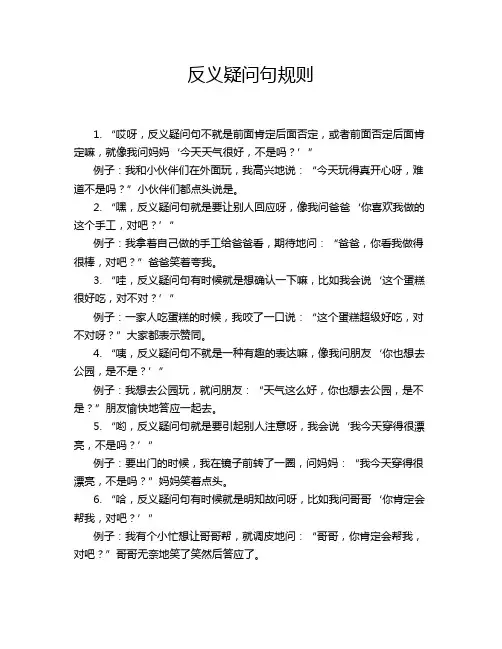
反义疑问句规则1. “哎呀,反义疑问句不就是前面肯定后面否定,或者前面否定后面肯定嘛,就像我问妈妈‘今天天气很好,不是吗?’”例子:我和小伙伴们在外面玩,我高兴地说:“今天玩得真开心呀,难道不是吗?”小伙伴们都点头说是。
2. “嘿,反义疑问句就是要让别人回应呀,像我问爸爸‘你喜欢我做的这个手工,对吧?’”例子:我拿着自己做的手工给爸爸看,期待地问:“爸爸,你看我做得很棒,对吧?”爸爸笑着夸我。
3. “哇,反义疑问句有时候就是想确认一下嘛,比如我会说‘这个蛋糕很好吃,对不对?’”例子:一家人吃蛋糕的时候,我咬了一口说:“这个蛋糕超级好吃,对不对呀?”大家都表示赞同。
4. “咦,反义疑问句不就是一种有趣的表达嘛,像我问朋友‘你也想去公园,是不是?’”例子:我想去公园玩,就问朋友:“天气这么好,你也想去公园,是不是?”朋友愉快地答应一起去。
5. “哟,反义疑问句就是要引起别人注意呀,我会说‘我今天穿得很漂亮,不是吗?’”例子:要出门的时候,我在镜子前转了一圈,问妈妈:“我今天穿得很漂亮,不是吗?”妈妈笑着点头。
6. “哈,反义疑问句有时候就是明知故问呀,比如我问哥哥‘你肯定会帮我,对吧?’”例子:我有个小忙想让哥哥帮,就调皮地问:“哥哥,你肯定会帮我,对吧?”哥哥无奈地笑了笑然后答应了。
7. “呐,反义疑问句就是这样的啦,像我问妹妹‘你也喜欢看动画片,是不是?’”例子:我和妹妹在看电视,我问她:“你也喜欢看动画片,是不是?”妹妹开心地说喜欢。
8. “嘿呀,反义疑问句能让对话更有意思呢,我会说‘你不会不喜欢吃冰淇淋吧?’”例子:我拿着冰淇淋问小伙伴:“这么好吃的冰淇淋,你不会不喜欢吃吧?”小伙伴赶紧说喜欢。
9. “哎呀呀,反义疑问句就是这样特别呀,像我问奶奶‘您最疼我了,对吧?’”例子:我依偎在奶奶身边,撒娇地问:“奶奶,您最疼我了,对吧?”奶奶满脸慈爱地说是。
10. “哇塞,反义疑问句可太有用啦,比如我问同学‘明天要上学,对吧?’”例子:放学的时候,我和同学讨论,我说:“明天要上学,对吧?”同学也说是呀。
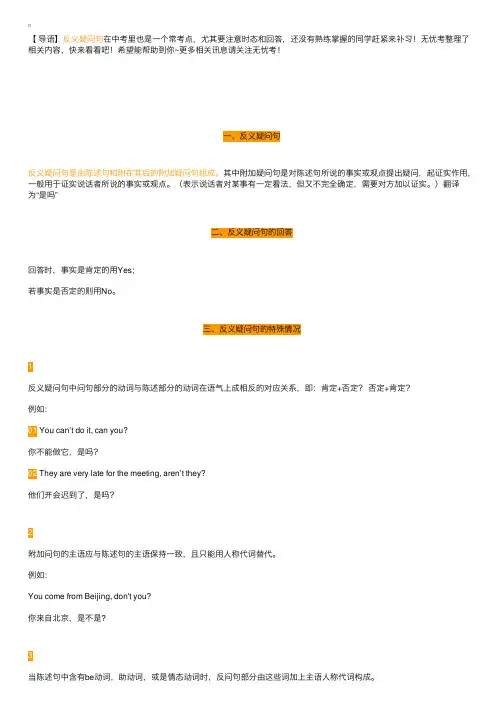
【导语】反义疑问句在中考⾥也是⼀个常考点,尤其要注意时态和回答,还没有熟练掌握的同学赶紧来补习!⽆忧考整理了相关内容,快来看看吧!希望能帮助到你~更多相关讯息请关注⽆忧考!⼀、反义疑问句反义疑问句是由陈述句和附在其后的附加疑问句组成。
其中附加疑问句是对陈述句所说的事实或观点提出疑问,起证实作⽤,⼀般⽤于证实说话者所说的事实或观点。
(表⽰说话者对某事有⼀定看法,但⼜不完全确定,需要对⽅加以证实。
)翻译为“是吗”⼆、反义疑问句的回答回答时,事实是肯定的⽤Yes;若事实是否定的则⽤No。
三、反义疑问句的特殊情况1反义疑问句中问句部分的动词与陈述部分的动词在语⽓上成相反的对应关系,即:肯定+否定?否定+肯定?例如:01 You can’t do it, can you?你不能做它,是吗?02 They are very late for the meeting, aren’t they?他们开会迟到了,是吗?2附加问句的主语应与陈述句的主语保持⼀致,且只能⽤⼈称代词替代。
例如:You come from Beijing, don't you?你来⾃北京,是不是?3当陈述句中含有be动词,助动词,或是情态动词时,反问句部分由这些词加上主语⼈称代词构成。
Be动词包括:am, is, are, was, were助动词有:do, does, did, have(⽤在完成时), has(⽤在完成时)等情态动词有:can, could, may, might, must, will, would, shall, should例如:01 He will go home, won’t he?他要回家了,是吗?02 She doesn’t like to eat popcorn, does she?她不喜欢吃爆⽶花,是吗?4have的不同⽤法,反义疑问句⽤不同的动词。
(1)have表“有”时,反义疑问句谓语动词⽤have/do都⾏。
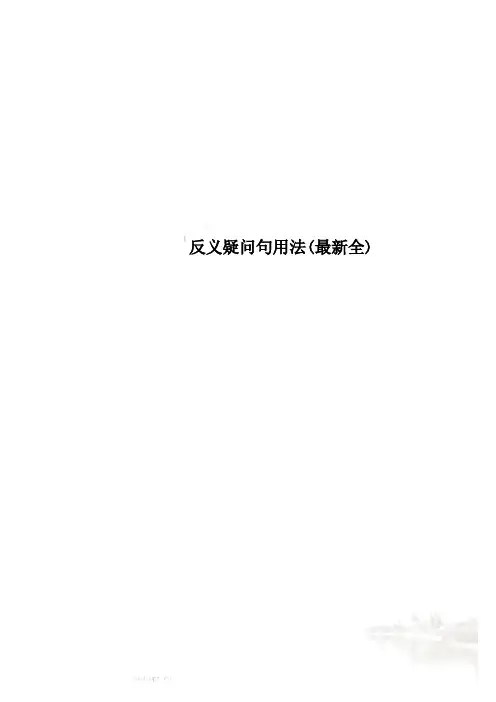
反义疑问句用法(最新全)1、当陈述句的主语为anybody, anyone, everybody, everyone, somebody, someone, nobody, noone时,反意疑问句的主语用they。
但亦可用he,尤其是nobody, no one等作主语,具有否定概念时。
如:如:Somebody phone d while I was out, didn’t they?Everyone enjoyed the party, didn’t they?Nobody wants to go there, does he?Nobody says a word about the incident, don’t they?Somebody borrowed your bike yesterday, didn’t they?Anybody can do it, can’t they?2、当陈述部分的主语是I,而句子又用来征询对方的意见时,附加疑问句中的主语用you。
如:如:I find Engli sh very interesting, don’t you?I don’t li ke that film, do you?3、当陈述句的主语为everything, anything, nothing, something等时,反意疑问句的主语用it.如:Everything is all right, isn’t it?Nothing can stop us going forward, can it?4、当陈述部分的主语是指示代词this, that或these, those时,附加疑问句中的主语分别用it和they。
如:This is important, isn’t it?That isn’t correct, is it?These are your fri ends Tom and Jack, aren’t they?5、当陈述句的主语为one时, 反意疑问句的主语在正式情况下用one;在非正式情况下用you.如:One should learn from others, shouldn’t one / you?One can’t be one’s own master, can one?One can not be too careful, can one?6、当陈述句的谓语部分含有had better, would rather, would like, ought to时, 反意疑问句的谓语应用相应的助动词。
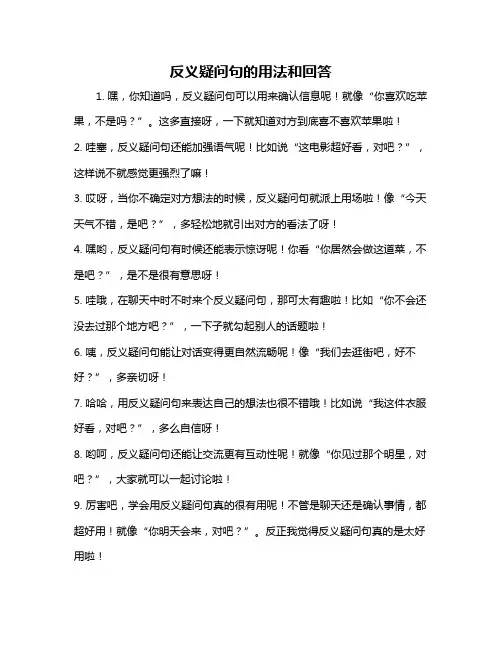
反义疑问句的用法和回答
1. 嘿,你知道吗,反义疑问句可以用来确认信息呢!就像“你喜欢吃苹果,不是吗?”。
这多直接呀,一下就知道对方到底喜不喜欢苹果啦!
2. 哇塞,反义疑问句还能加强语气呢!比如说“这电影超好看,对吧?”,这样说不就感觉更强烈了嘛!
3. 哎呀,当你不确定对方想法的时候,反义疑问句就派上用场啦!像“今天天气不错,是吧?”,多轻松地就引出对方的看法了呀!
4. 嘿哟,反义疑问句有时候还能表示惊讶呢!你看“你居然会做这道菜,不是吧?”,是不是很有意思呀!
5. 哇哦,在聊天中时不时来个反义疑问句,那可太有趣啦!比如“你不会还没去过那个地方吧?”,一下子就勾起别人的话题啦!
6. 咦,反义疑问句能让对话变得更自然流畅呢!像“我们去逛街吧,好不好?”,多亲切呀!
7. 哈哈,用反义疑问句来表达自己的想法也很不错哦!比如说“我这件衣服好看,对吧?”,多么自信呀!
8. 哟呵,反义疑问句还能让交流更有互动性呢!就像“你见过那个明星,对吧?”,大家就可以一起讨论啦!
9. 厉害吧,学会用反义疑问句真的很有用呢!不管是聊天还是确认事情,都超好用!就像“你明天会来,对吧?”。
反正我觉得反义疑问句真的是太好用啦!。
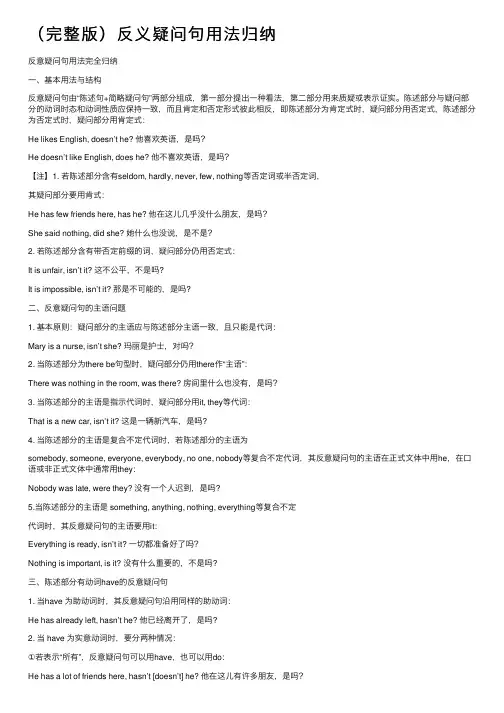
(完整版)反义疑问句⽤法归纳反意疑问句⽤法完全归纳⼀、基本⽤法与结构反意疑问句由“陈述句+简略疑问句”两部分组成,第⼀部分提出⼀种看法,第⼆部分⽤来质疑或表⽰证实。
陈述部分与疑问部分的动词时态和动词性质应保持⼀致,⽽且肯定和否定形式彼此相反,即陈述部分为肯定式时,疑问部分⽤否定式,陈述部分为否定式时,疑问部分⽤肯定式:He likes English, doesn’t he? 他喜欢英语,是吗?He doesn’t like English, does he? 他不喜欢英语,是吗?【注】1. 若陈述部分含有seldom, hardly, never, few, nothing等否定词或半否定词,其疑问部分要⽤肯式:He has few friends here, has he? 他在这⼉⼏乎没什么朋友,是吗?She said nothing, did she? 她什么也没说,是不是?2. 若陈述部分含有带否定前缀的词,疑问部分仍⽤否定式:It is unfair, isn’t it? 这不公平,不是吗?It is impossible, isn’t it? 那是不可能的,是吗?⼆、反意疑问句的主语问题1. 基本原则:疑问部分的主语应与陈述部分主语⼀致,且只能是代词:Mary is a nurse, isn’t she? 玛丽是护⼠,对吗?2. 当陈述部分为there be句型时,疑问部分仍⽤there作“主语”:There was nothing in the room, was there? 房间⾥什么也没有,是吗?3. 当陈述部分的主语是指⽰代词时,疑问部分⽤it, they等代词:That is a new car, isn’t it? 这是⼀辆新汽车,是吗?4. 当陈述部分的主语是复合不定代词时,若陈述部分的主语为somebody, someone, everyone, everybody, no one, nobody等复合不定代词,其反意疑问句的主语在正式⽂体中⽤he,在⼝语或⾮正式⽂体中通常⽤they:Nobody was late, were they? 没有⼀个⼈迟到,是吗?5.当陈述部分的主语是 something, anything, nothing, everything等复合不定代词时,其反意疑问句的主语要⽤it:Everything is ready, isn’t it? ⼀切都准备好了吗?Nothing is important, is it? 没有什么重要的,不是吗?三、陈述部分有动词have的反意疑问句1. 当have 为助动词时,其反意疑问句沿⽤同样的助动词:He has already left, hasn’t he? 他已经离开了,是吗?2. 当 have 为实意动词时,要分两种情况:①若表⽰“所有”,反意疑问句可以⽤have,也可以⽤do:He has a lot of friends here, hasn’t [doesn’t] he? 他在这⼉有许多朋友,是吗?但是若陈述部分⽤的是have的否定式,反意疑问句⽤have 还是⽤do,取决于陈述部分的动词形式:He hasn’t any money, has he? 他没有钱,是吗?He doesn’t have any money, does he? 他没有钱,是吗?②若表⽰“吃”、“玩”等意思,反意疑问句要⽤do:He has supper at 5, doesn’t he? 他5点吃晚餐,是吗?He had a good time at the party, didn’t he? 他在晚会上玩得很开⼼,是吗?3. 当⽤于have to时,通常也有两种可能:若表⽰经常性的⾏为,则多⽤加助动词do的形式;若表⽰特定的⾏为,则多⽤have:He often has to get up early, doesn’t he? 他经常要早起,是吗?He has to go to bed late tonight, hasn’t he? 他今晚要迟睡,是吗?四、含情态动词的反意疑问句1. 基本原则:在通常情况下,当陈述部分含有情态动词时,疑问部分会重复前⾯同样的情态动词:He can speak English, can’t he?他会说英语,是吗?We shouldn’t go, should we? 我们不应该去,对不对?2. 当陈述部分含有must时,要分两种情况:①若must表⽰“必须”或“有必要”,疑问部分⽤mustn’t或needn’t:You must leave at once, mustn’t [needn’t] you? 你必须(有必要)马上离开,是吗?但是若陈述部分有mustn’t表⽰禁⽌,疑问部分要must:You mustn’t laugh, must you? 你不准笑,知道吗?②若must表⽰推测,疑问部分不能⽤must,⽽应根据must后的动词结构采⽤相应的动词形式:He must be tired, isn’t he? 他⼀定累了,是吗?五、陈述部分为祈使句的反意疑问句1. 基本原则:若陈述部分为祈使句,疑问部分通常⽤will you:Please help us, will you? 请帮帮我们,好吗?Come with us, will you? 同我们⼀起去,好吗?Don’t forget to post the letter, will you? 请别忘了寄信。
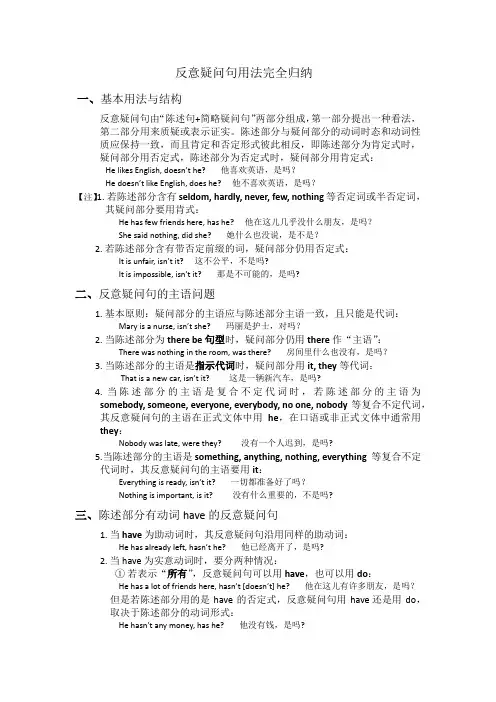
反意疑问句用法完全归纳一、基本用法与结构反意疑问句由“陈述句+简略疑问句”两部分组成,第一部分提出一种看法,第二部分用来质疑或表示证实。
陈述部分与疑问部分的动词时态和动词性质应保持一致,而且肯定和否定形式彼此相反,即陈述部分为肯定式时,疑问部分用否定式,陈述部分为否定式时,疑问部分用肯定式:He likes English,doesn’t he?他喜欢英语,是吗?He doesn’t like English,does he? 他不喜欢英语,是吗?【注】1.若陈述部分含有seldom,hardly,never,few,nothing等否定词或半否定词,其疑问部分要用肯式:He has few friends here,has he?他在这儿几乎没什么朋友,是吗?She said nothing,did she?她什么也没说,是不是?2.若陈述部分含有带否定前缀的词,疑问部分仍用否定式:It is unfair,isn’t it?这不公平,不是吗?It is impossible,isn’t it?那是不可能的,是吗?二、反意疑问句的主语问题1.基本原则:疑问部分的主语应与陈述部分主语一致,且只能是代词:Mary is a nurse,isn’t she? 玛丽是护士,对吗?2.当陈述部分为there be句型时,疑问部分仍用there作“主语”:There was nothing in the room,was there?房间里什么也没有,是吗?3.当陈述部分的主语是指示代词时,疑问部分用it,they等代词:That is a new car,isn’t it?这是一辆新汽车,是吗?4.当陈述部分的主语是复合不定代词时,若陈述部分的主语为somebody,someone,everyone,everybody,no one,nobody等复合不定代词,其反意疑问句的主语在正式文体中用he,在口语或非正式文体中通常用they:Nobody was late,were they?没有一个人迟到,是吗?5.当陈述部分的主语是something,anything,nothing,everything等复合不定代词时,其反意疑问句的主语要用it:Everything is ready,isn’t it? 一切都准备好了吗?Nothing is important,is it?没有什么重要的,不是吗?三、陈述部分有动词have的反意疑问句1.当have为助动词时,其反意疑问句沿用同样的助动词:He has already left,hasn’t he?他已经离开了,是吗?2.当have为实意动词时,要分两种情况:①若表示“所有”,反意疑问句可以用have,也可以用do:He has a lot of friends here,hasn’t[doesn’t]he?他在这儿有许多朋友,是吗?但是若陈述部分用的是have的否定式,反意疑问句用have还是用do,取决于陈述部分的动词形式:He hasn’t any money,has he?他没有钱,是吗?He doesn’t have any money,does he?他没有钱,是吗?②若表示“吃”、“玩”等意思,反意疑问句要用do:He has supper at5,doesn’t he? 他5点吃晚餐,是吗?He had a good time at the party,didn’t he?他在晚会上玩得很开心,是吗?3.当用于have to时,通常也有两种可能:若表示经常性的行为,则多用加助动词do的形式;若表示特定的行为,则多用have:He often has to get up early,doesn’t he?他经常要早起,是吗?He has to go to bed late tonight,hasn’t he?他今晚要迟睡,是吗?四、含情态动词的反意疑问句1.基本原则:在通常情况下,当陈述部分含有情态动词时,疑问部分会重复前面同样的情态动词:He can speak English,can’t he?他会说英语,是吗?We shouldn’t go,should we?我们不应该去,对不对?2.当陈述部分含有must时,要分两种情况:①若must表示“必须”或“有必要”,疑问部分用mustn’t或needn’t:You must leave at once,mustn’t[needn’t]you?你必须(有必要)马上离开,是吗?但是若陈述部分有mustn’t表示禁止,疑问部分要must:You mustn’t laugh,must you?你不准笑,知道吗?②若must表示推测,疑问部分不能用must,而应根据must后的动词结构采用相应的动词形式:He must be tired,isn’t he?他一定累了,是吗?五、陈述部分为祈使句的反意疑问句1.基本原则:若陈述部分为祈使句,疑问部分通常用will you:Please help us,will you?请帮帮我们,好吗?Come with us,will you?同我们一起去,好吗?Don’t forget to post the letter,will you?请别忘了寄信。
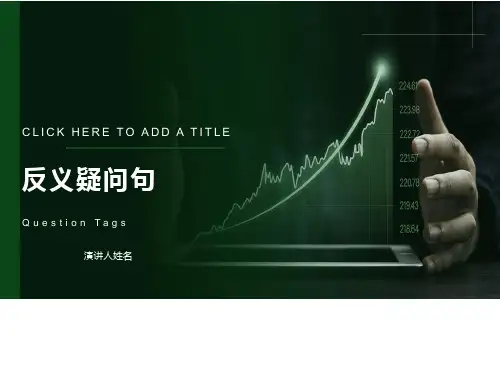
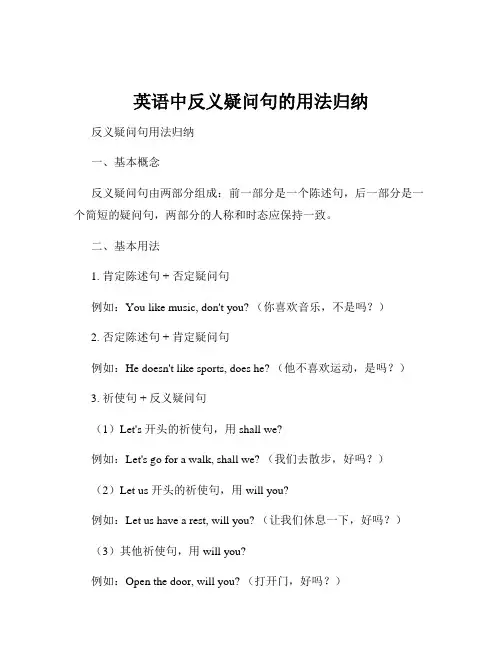
英语中反义疑问句的用法归纳反义疑问句用法归纳一、基本概念反义疑问句由两部分组成:前一部分是一个陈述句,后一部分是一个简短的疑问句,两部分的人称和时态应保持一致。
二、基本用法1. 肯定陈述句 + 否定疑问句例如:You like music, don't you? (你喜欢音乐,不是吗?)2. 否定陈述句 + 肯定疑问句例如:He doesn't like sports, does he? (他不喜欢运动,是吗?)3. 祈使句 + 反义疑问句(1)Let's 开头的祈使句,用 shall we?例如:Let's go for a walk, shall we? (我们去散步,好吗?)(2)Let us 开头的祈使句,用 will you?例如:Let us have a rest, will you? (让我们休息一下,好吗?)(3)其他祈使句,用 will you?例如:Open the door, will you? (打开门,好吗?)4. 含有 must 的反义疑问句(1)must 表示“必须”时,用 needn't例如:You must finish your homework today, needn't you? (你今天必须完成作业,不是吗?)(2)must 表示推测“一定,肯定”时,根据实际情况而定例如:He must be very tired, isn't he? (他一定很累了,不是吗?)5. 含有否定词的反义疑问句当陈述句中有 never, few, little, nothing, nobody 等否定词时,反义疑问句用肯定形式。
例如:There is nothing in the box, is there? (盒子里什么都没有,是吗?)三、固定搭配1. “I am + 表语”,反义疑问句用“aren't I”例如:I'm late, aren't I? (我迟到了,不是吗?)2. 陈述部分是“there be”结构,反义疑问句用“be there”例如:There is a book on the desk, isn't there? (桌子上有一本书,不是吗?)3. 当陈述部分主语是不定代词 everyone, somebody, nobody, everyone 等时,反义疑问句用 they 或 he例如:Everyone is here, aren't they? (大家都在这儿,不是吗?)4. 当陈述部分主语是 this, that 时,反义疑问句用 it;当陈述部分主语是 these, those 时,反义疑问句用 they例如:This is a pen, isn't it? (这是一支钢笔,不是吗?)5. 当陈述部分是主从复合句时,反义疑问句与主句的主语和谓语保持一致例如:He said he would come, didn't he? (他说他会来,不是吗?)双语例句:1. I have a lot of friends, don't I? (我有很多朋友,不是吗?)2. She doesn't speak French, does she? (她不会说法语,是吗?)3. Have a cup of coffee, will you? (喝杯咖啡,好吗?)4. We should study hard, shouldn't we? (我们应该努力学习,不是吗?)5. They have been to Beijing, haven't they? (他们去过北京,不是吗?)6. You aren't a doctor, are you? (你不是医生,对吧?)7. There are some apples on the tree, aren't there? (树上有一些苹果,不是吗?)8. Nobody knows the answer, do they? (没人知道答案,对吧?)9. This isn't your book, is it? (这不是你的书,对吧?)10. Those are beautiful flowers, aren't they? (那些是漂亮的花,不是吗?)11. He can swim very well, can't he? (他游泳游得很好,不是吗?)12. She never tells lies, does she? (她从不说谎,对吧?)13. We had a great time yesterday, didn't we? (我们昨天玩得很开心,不是吗?)14. If it rains tomorrow, we won't go hiking, will we? (如果明天下雨,我们就不去徒步了,对吧?)15. You think he is right, don't you? (你认为他是对的,不是吗?)16. Mary has few friends here, does she? (玛丽在这儿几乎没朋友,对吧?)17. The boy doesn't like vegetables, does he? (这男孩不喜欢蔬菜,是吗?)18. Everyone wants to be happy, don't they? (每个人都想快乐,不是吗?)19. I'm a good student, aren't I? (我是个好学生,不是吗?)20. He told you the truth, didn't he? (他告诉你真相了,不是吗?)。
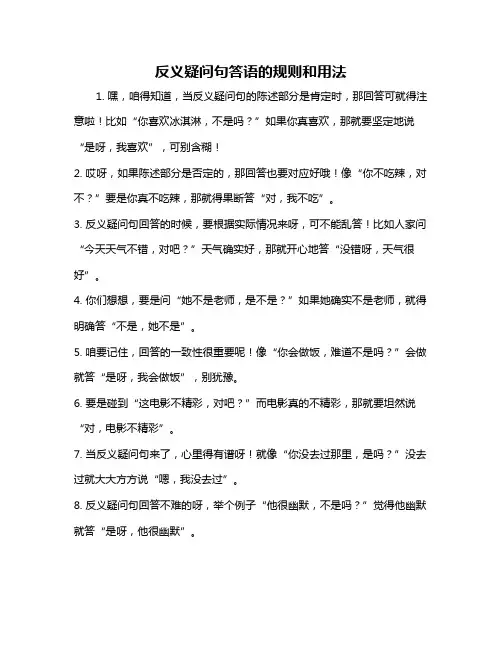
反义疑问句答语的规则和用法
1. 嘿,咱得知道,当反义疑问句的陈述部分是肯定时,那回答可就得注意啦!比如“你喜欢冰淇淋,不是吗?”如果你真喜欢,那就要坚定地说“是呀,我喜欢”,可别含糊!
2. 哎呀,如果陈述部分是否定的,那回答也要对应好哦!像“你不吃辣,对不?”要是你真不吃辣,那就得果断答“对,我不吃”。
3. 反义疑问句回答的时候,要根据实际情况来呀,可不能乱答!比如人家问“今天天气不错,对吧?”天气确实好,那就开心地答“没错呀,天气很好”。
4. 你们想想,要是问“她不是老师,是不是?”如果她确实不是老师,就得明确答“不是,她不是”。
5. 咱要记住,回答的一致性很重要呢!像“你会做饭,难道不是吗?”会做就答“是呀,我会做饭”,别犹豫。
6. 要是碰到“这电影不精彩,对吧?”而电影真的不精彩,那就要坦然说“对,电影不精彩”。
7. 当反义疑问句来了,心里得有谱呀!就像“你没去过那里,是吗?”没去过就大大方方说“嗯,我没去过”。
8. 反义疑问句回答不难的呀,举个例子“他很幽默,不是吗?”觉得他幽默就答“是呀,他很幽默”。
9. 所以说呀,掌握反义疑问句答语的规则和用法其实很简单呢!大家多练习练习,就会发现真的超容易!
我的观点结论就是:只要理解清楚、多加练习,搞定反义疑问句答语根本不是事儿!。
反义疑问句的用法归纳及回答举例初中
摘要:
一、反义疑问句的用法归纳
1.反义疑问句的构成
2.反义疑问句的回答方式
3.反义疑问句的注意事项
二、反义疑问句的回答举例
1.肯定回答举例
2.否定回答举例
正文:
一、反义疑问句的用法归纳
1.反义疑问句的构成
反义疑问句通常由两部分组成:一个陈述句和一个简短的疑问句。
陈述句和疑问句之间通常有一个逗号分隔,而且疑问句部分常常以“难道不是吗?”等反问语气词结尾。
例如:“你不喜欢吃苹果,难道不是吗?”
2.反义疑问句的回答方式
当反义疑问句用于询问对方意见时,回答时要根据事实情况给出肯定或否定的回答。
如果事实情况与陈述句一致,回答为肯定;如果事实情况与陈述句相反,回答为否定。
例如,对于“你不喜欢吃苹果,难道不是吗?”这个问题,如果对方确实不喜欢吃苹果,回答应该是“是的,我不喜欢。
”
3.反义疑问句的注意事项
在使用反义疑问句时,要注意陈述句和疑问句的一致性。
如果陈述句是肯定形式,疑问句部分也应该是肯定形式;如果陈述句是否定形式,疑问句部分也应该是否定形式。
此外,反义疑问句通常用于表示对某事不确定或想要得到对方确认的情况下,所以要根据实际情况适当使用。
二、反义疑问句的回答举例
1.肯定回答举例
张三问:“你不喜欢吃苹果,难道不是吗?”
李四回答:“是的,我不喜欢。
”
2.否定回答举例
张三问:“你不喜欢吃苹果,难道不是吗?”
李四回答:“不,我喜欢吃苹果。
最全反意疑问句用法(精选5篇)第一篇:最全反意疑问句用法反意疑问句用法:一、什么叫反意疑问句:英语中,反意疑问句是由陈述句和附在其后的附加疑问句组成。
其中附加疑问句是对陈述句所说的事实或观点提出疑问,起证实作用,一般用于证实说话者所说的事实或观点。
二、特殊形式的反意疑问句归纳:一、There be 句型陈述句比较特殊, 其附加疑问句的结构为there be的倒装,不带句子主语。
例如:There is something wrong with the computer, isn't there? 这台电脑有点毛病,是不是?There aren't any fish in the river, are there? 这条河里没有鱼, 是吗?二、当陈述部分的主语是I,而句子又用来征询对方的意见时,附加疑问句中的主语用you。
如:I find English very interesting, don’t you?I don’t like that fil m, do you?三、当陈述部分的主语是指示代词this, that或these, those时,附加疑问句中的主语分别用it和they。
如:This is important, isn’t it?That isn’t correct, is it?These are your friends Tom and Jack, aren’t they?四、当陈述部分的主语是everyone, everybody, someone, nobody, no one, none, anyone, somebody等合成不定代词时, 在非正式文体中,附加疑问句中的主语通常用he或they。
例如:Someone opened the door, didn't he/they? 有人开了门,是不是?Nobody went to the cinema, did they? 没人去看电影,是吗?五、当陈述部分的主语是everything, nothing, something,anything等合成词,附加疑问句中的主语用it。
反义疑问句用法(最新全)1.反义疑问句的用法当陈述句的主语为anybody。
anyone。
everybody。
everyone。
___。
someone。
nobody。
no one时,反意疑问句的主语用they。
但是,当nobody。
no one等作主语时,可以使用he,尤其是具有否定概念时。
例如:有人在我出去的时候打电话了,是吗?派对上每个人都很开心,是吗?没有人想去那里,是吗?没有人谈论这件事,是吗?昨天有人借了你的自行车,是吗?任何人都可以做到,是吗?2.当陈述部分的主语是I,而句子又用来征询对方的意见时,附加疑问句中的主语用you。
例如:我觉得英语很有趣,你觉得呢?我不喜欢那部电影,你呢?3.当陈述句的主语为everything。
anything。
nothing。
something等时,反意疑问句的主语用it。
例如:一切都好,是吗?没有什么可以阻止我们前进,是吗?4.当陈述部分的主语是指示代词this。
that或these。
those 时,附加疑问句中的主语分别用it和they。
例如:这很重要,是吗?那不正确,是吗?这些是你的朋友___和___,是吗?5.当陈述句的主语为one时,在正式情况下反义疑问句的主语用one,在非正式情况下用you。
例如:人们应该向别人研究,不是吗?人不能成为自己的主人,是吗?When ___ such as "had better," "would rather," "would like,"or "ought to," the tag n should use the corresponding auxiliary verb。
For example。
"You'd better go now。
hadn't you?" or "He'd like to go there。
反义疑问句(含解析、例句及详尽用法)-CAL-FENGHAI.-(YICAI)-Company One1反义疑问句一、祈使句的反义疑问句1、肯定祈使句Will you/won’t you2、否定祈使句Will you3、Let的祈使句Let us ...,will you(此处Let us 表示“允许我们...”)Let’s...,shall we (此处Let’s表示“让我们...吧”)Let + 第三人称...,will you二、Must的反义疑问句1、表示“必须” musn’t /needn’tEg. You must go now, needn’t you2、表示“不准”Eg. You musn’t smoke here, must/may you3、表示推测,肯定。
(I’m sure + 从句)Eg. You must be hungry now, aren’t youI’m sure you are hungry now, aren’t youShe must have heard about that, hasn’t sheI’m sure you have heard about that, haven’t youYou must have watched that movie last night, didn’t you(last nigh为具体时间点,所以用一般过去式)三、主语(反义疑问句)+从句主句:I(don’t)think/believe/consider/suppose 或 I’m afraid/sure...后跟从句时,可将从句部分进行反义疑问Eg. I don’t think he will win, will heI think he will win, won’t heShe thinks he will win, doesn’t she(当主句主语不是I时不适用于该用法,此句中的翻译疑问针对的是主句而非从句)四、当句中包含有表示否定意义的副词或不定代词时,反义疑问句用肯定形式Eg. Nothing happened to him, did itIt is unfair, isn’t itHe dislikes watching TV, doesn’t he(该句中含否定意义的是动词而非副词或不定代词,因此不适用于该用法,反义疑问句仍然使用否定形式)五、反义疑问句的回答反义疑问句的回答针对被提问部分的谓语动词,且与回答句前部分的Yes和No 保持一致Eg. A: You haven’t lost the ticket, have youB: D I know it’s hard to get another one at this moment.A. Yes, I haven’tB. No, I haveC. I hope soD. I’m afraid not六、陈述部分的主语与反义疑问句主语保持一致的情况1、OneEg. One can’t be too careful when driving a car, can one/he一个人在开车的时候再怎么小心也不为过。
1、当陈述句的主语为anybody, anyone, everybody, everyone, somebody, someone, nobody, no one时,反意疑问句的主语用they。
但亦可用he,尤其是nobody, no one 等作主语,具有否定概念时。
如:如:Somebody phoned while I was out, didn't they?Everyone enjoyed the party, didn't they?Nobody wants to go there, does he?Nobody says a word about the incident, don't they?Somebody borrowed your bike yesterday, didn't they? Anybody can do it, can't they?2、当陈述部分的主语是I,而句子又用来征询对方的意见时,附加疑问句中的主语用you。
如:如:Ifind English very interesting, don't you?I don't like that film, do you?3、当陈述句的主语为everything, anything, nothing, something 等时,反意疑问句的主语用it. 如:Everything is all right, isn't it?Nothing can stop us going forward, can it?4、当陈述部分的主语是指示代词this, that 或these, those 时,附加疑问句中的主语分别用it 和they。
如:This is important, isn't it?That isn't correct, is it?These are your friends Tom and Jack, aren't they?5、当陈述句的主语为one时, 反意疑问句的主语在正式情况下用one;在非正式情况下用you. 如:Oneshould learn from others, shouldn't one / you?One can't be one's own master, can one?One can not be too careful, can one?6、当陈述句的谓语部分含有had better, would rather, would like, ought to 时, 反意疑问句的谓语应用相应的助动词。
反义疑问句的用法反义疑问句(The Disjunctive Question 或 Question tags) 即附加疑问句。
它表示提问人的看法,没有把握,需要对方证实。
以下是由店铺整理关于反义疑问句的用法,提供给大家参考和了解,希望大家喜欢!一、反意疑问句的简介英语中,反意疑问句是由陈述句和附在其后的附加疑问句组成。
其中附加疑问句是对陈述句所说的事实或观点提出疑问,起证实作用,一般用于证实说话者所说的事实或观点。
二、反意疑问句用法说明注意:反意疑问句前后两部分谓语应是,“肯定陈述+否定疑问”或“否定陈述+肯定疑问”简略问句如果是否定式,not应与be,do,will等系动词、助动词、情态动词缩写简略问句的主语不用名词,应用人称代词当说话者的目的不在疑问,而是为了加强语气时,用降调当说话者的目的在疑问,则用升调陈述部分含“too...to”时,是否定句1) 陈述部分的主语是I,疑问部分要用 aren't I.I'm as tall as your sister,aren't I?(我和你姐姐一样高,对吗?)2) 陈述部分的谓语是wish,疑问部分要用may +主语。
I wish to have a word with you, may I?(我希望可以和你说话,可以吗?)3) 陈述部分用 no, nothing, nobody, never, few, seldom, hardly, rarely, little等否定含义的词时,疑问部分用肯定含义。
The Swede made no answer, did he / she?Some plants never blown (开花), do they ?4) 含有ought to 的反意疑问句,陈述部分是肯定的,疑问部分用shouldn't / oughtn't +主语。
He ought to know what to do, oughtn't he? / shouldn't he?5) 陈述部分有have to +v. (had to + v.),疑问部分常用don't +主语(didn't +主语)。
1、当陈述句的主语为anybody, anyone, everybody, everyone, somebody, someone, nobody, noone时,反意疑问句的主语用they。
但亦可用he,尤其是nobody, no one等作主语,具有否定概念时。
如:如:Somebody phone d while I was out, didn’t they?Everyone enjoyed the party, didn’t they?Nobody wants to go there, does he?Nobody says a word about the incident, don’t they?Somebody borrowed your bike yesterday, didn’t they?Anybody can do it, can’t they?2、当陈述部分的主语是I,而句子又用来征询对方的意见时,附加疑问句中的主语用you。
如:如:I find Engli sh very interesting, don’t you?I don’t like that film, do you?3、当陈述句的主语为everything, anything, nothing, something等时,反意疑问句的主语用it.如:Everything is all right, isn’t it?Nothing can stop us going forward, can it?4、当陈述部分的主语是指示代词this, that或these, those时,附加疑问句中的主语分别用it和they。
如:This is important, isn’t it?That isn’t correct, is it?These are your fri ends Tom and Jack, aren’t they?5、当陈述句的主语为one时, 反意疑问句的主语在正式情况下用one;在非正式情况下用you.如:One should learn from others, shouldn’t one / you?One can’t be one’s own master, can one?One can not be too careful, can one?6、当陈述句的谓语部分含有had better, would rather, would like, ought to时, 反意疑问句的谓语应用相应的助动词。
如:You’d better go now, hadn’t you?You’d rather go there early, wouldn’t you?He’d like to go there, wouldn’t he?She ought to go there by train, shouldn’t / oughtn’t she?Such things ought not to be allowed, ought they?He ought to be punished, oughtn’t he?7、当陈述句的谓语是wish时, 反意疑问句的谓语用may, 而且前后两个部分都用肯定式。
E.g.如:I wish to go home now, may I?I wish to have another piece of cake, may I?8、当陈述句的谓语部分含有have to, had to时, 反意疑问句的谓语部分用do的适当形式。
如:We have to get there at 8 o’clock tomorrow, don’t we?They had to take the early train to go there, didn’t they?9、当陈述句的谓语部分含有used to时, 反意疑问句的谓语部分有两种表达方式didn’t / usedn’t。
如:He used to get up early, didn’t / usedn’t he?The old man used to smoke, di dn’t he?或usedn’t he?Tom used to live here, usedn’t he?或didn’t he?10、感叹句后的附加疑问句的谓语动词需用be的现在时,且常用否定形式。
如:如:What a clever boy, isn’t he?What a lovely day, isn’t it?11、当陈述句的主语是第一人称,谓语动词是think, believe, suppose, fancy, imagine, expect,后接宾语从句时, 反意疑问句应对宾语从句进行提问。
如:I don’t think he can finish the work, can he?I don’t expect that she would come, would she?I imagine that the students like her, don’t they?I don’t believe she knows it, does she?12、当陈述句的主语是第二,第三人称,谓语动词是think, believe, suppose, fancy, imagine, expect后接宾语从句时, 反意疑问句应对主句进行提问。
如:Mary thinks you will come to the meeting, doesn’t she?You don’t think English is important, do you?You think she is a good teacher, don’t you?Your brother thinks that you can do the job well, doesn’t he?13、陈述部分带有seldom, hardly, never, rarely, few, little, nowhere, nothing, nobody, scarcely等否定词或半否定词时,附加疑问部分的动词用肯定形式。
如:如:Bob rarely got drunk, did he?Few people know him, do they?She seldom goes to the cinema, does she?He has few good reasons for staying, has he?She hardly writes to you, does she?There is little water in the bottle, is there?如果陈述部分的否定词带有否定前缀,那么,该陈述部分作肯定处理,附加疑问部分一般仍用否定形式。
如:如:He was unsuccessful, wasn’t he?Tom dislikes the book, doesn’t he?14、祈使句的各种反意疑问句:1). Let’s …, shall we? E.g. Let’s go to the film, shall we?2). Let us … , will you? E.g. Let us go to the park, will you?3). Let me … , may I / will you ?E.g. Let me go there alone, may I? / will you?If you want help-money or anything, let me know, will you?4). 在否定的祈使句的后面,只能用will you? E.g. Don’t tell anyone, will you?5). 表示“请求” 意思的祈使句,反意疑问句用will you?E.g. Pass me the dictionary, will you?Stop that noise, will you?6). 表示“邀请”, “劝诱” 意思的祈使句,反意疑问句用won’t you?E.g. Join us in the singing, won’t you?15、陈述句中谓语动词是must + have + 动词的过去分词时,如果强调对过去情况的推测, 依据是(句中有过去的时间状语),反意疑问句根据动词用didn’t / wasn’t / weren’t +主语。
如:You must have read the story last term, didn’t you?He must have met her yesterday, didn’t he?16、陈述句中谓语动词是must + have + 动词的过去分词时,如果只强调动作的完成,反意疑问句用haven’t / hasn’t +主语。
如:She mus t have arrived there, hasn’t she?You must have seen the film, haven’t you?17、陈述句中谓语动词是must + 动词原形的情况:You must see the doctor, needn’t you? (must在这里不表示”必须”,只表示”有必要”,所以不重复must, 要用need)如:You mustn’t do that again, must you?The food must be nice, isn’t it? (must be在这里表示推测,要用be 的适当形式)The boys mustn’t play with fire, may they? (当must表示”禁止”时,反意问句要用may.) 18、当陈述句的主语为each时, 反意疑问句的主语用he。
如:Each has his strong points, hasn’t he? / doesn’t he?19、当陈述句的主语为each of us, each of you, each of them时, 反意疑问句的主语用we, you,they。
如:Each of us has been here, haven’t we?Each of them has an English dictionary, haven’t they?20、当陈述句的主语为each of … 结构时,反意疑问句的主语用he ,she, it 强调个体, 用we, you,they 强调全体。
如:Each of these novels is to be discussed this term, isn’t it?Each of us h ave got the prize, haven’t we?21、当陈述部分是并列句,附加疑问句则需和就近的分句的主语和谓语一致。